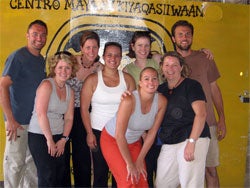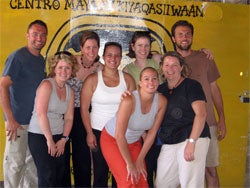 Five graduate students offer clinical skills, friendship to children
Five graduate students offer clinical skills, friendship to children
KINGSTON, R.I. — February 1, 2006 — The five University of Rhode Island physical therapy students and one alumna were stunned, but not by the lack of indoor plumbing or the homes with dirt floors in San Juan La Laguna, Guatemala.
“They were amazed by the beauty of the people and the beauty of the place,” said Jenny Audette, URI clinical assistant professor of physical therapy.
Audette and her students recently recounted their two-week December stay in the Guatemalan village, during which they provided physical therapy services to local children and befriended them, got to know their parents and enjoyed the breathtaking beauty of the countryside. Some even learned weaving from the villagers.
A physical therapy professor at URI for the past two years and a resident of South Kingstown, Audette said it was the first time she had taken a group of students to Central America to do such work. The five students are now completing internships and will earn their masters’ degrees in physical therapy in May.
Each student paid his or her own way, and received two credits for the course titled International Service Oriented Clinical Experience. They worked at the Centro Maya, a center for children with physical and cognitive disabilities. The non-profit agency relies heavily on volunteers and donations to remain in operation.
“The center has three to four paid staff members, but much of the work is done by volunteers from the United States, France, Belgium, Canada and a number of other countries,” Audette said.
Audette, whose program is housed in URI’s College of Human Science and Services, and her students worked with youngsters with developmental disabilities, such as cerebral palsy and spina bifida. They provided services to a boy who was paralyzed by a virus he contracted during Hurricane Stan, which hit Central America in early October 2005 and killed 1,500 people in Guatemala alone.
Physical therapy student Amy Woodard of Wakefield, who earned her bachelor’s degree in biological sciences from URI, had never traveled outside the United States until this trip. “I knew if I didn’t go I would regret it. This was a totally new experience, during which I encountered a new culture, language and new lifestyles. I also had a chance to do physical therapy with children who didn’t speak my language, so I had to use my creative skills.”
She said the trip made her a more confident physical therapist. “I hadn’t worked with children before, and now I know that I can. And with the lack of resources, we all had to learn new ways to conduct therapy.”
The team spent its time working with the children, educating families and conducting home visits. Carpenter Damon Arndt, the husband of physical therapy student Shannon Arndt, built a physical therapy room with a platform for an exercise mat and shelves for supplies. In addition, the team built a set of parallel bars outside the home of one child so he could exercise at home.
“Damon also built a huge swing set,” Audette said. “Most of the children had never seen a swing set, and it was so gratifying to see them learning how to use it.”
Shannon Arndt said the students are fortunate that Audette wanted to widen the students’ experiences as much as possible. “I am hoping that it’s not a once-in-a-lifetime experience for my husband and me,” said Arndt, a resident of Seattle. “The people we met were so welcoming and so open to helping their children in whatever way they could, and the people at the clinic are absolutely dedicated to the children.”
She and her classmates also provided home care for several youngsters. “We were able to help the parents learn the exercises, so they in turn could help their children, and we provided some assistive devices that they could use at home.”
Many village homes are made of cinder blocks, and the kitchens are outside. Most have dirt floors, and animals roam freely through the dwellings. “The poverty is striking, but we had a great time with each other and in working with such gracious, warm families,” Audette said.
The team also brought plenty of toys and candy to give to the kids as icebreakers. “These were very important ways for us to connect with the children and their families,” she said.
Audette said one of the harder things for the physical therapy students was breaking down the stigma that disability carries in some families.
“And because the facilities are nothing like what we have here in this country, we had to use all our usual clinical skills in creative ways. It was challenging and fun working with a diverse culture with heavy Spanish and Mayan influences.”
Audette said while the clinical experience gained by the students was valuable, there was an even more important lesson. “The trip helped all of us keep things in perspective and appreciate the privilege and luxury of providing health care in this country.”
Pictured above
THE GANG’S ALL HERE: A group from the University of Rhode Island’s Physical Therapy Program poses before the sign at the agency in Guatemala where it provided physical therapy services in December. In the front row from left are students Amy Woodard, of Wakefield, Alicia Rubino of Cranston, and Jessica Moran (bending over) of Wakefield, and Professor Jenny Audette of South Kingstown. Back row from left are: student Mark Ruzzo of Coventry, Andrea Mitchell, a 2001 URI physical therapy graduate who lives in Providence and works at Performance Physical Therapy in Pawtucket, student Shannon Arndt of Seattle, and her husband Damon, a carpenter who helped construct some additional facilities. Photo courtesy of Jenny Audette.

